
-
Find the right food for your petTake this quiz to see which food may be the best for your furry friend.Find the right food for your petTake this quiz to see which food may be the best for your furry friend.Featured products
 Adult Perfect Digestion Salmon, Whole Oats, and Brown Rice Recipe Dog Food
Adult Perfect Digestion Salmon, Whole Oats, and Brown Rice Recipe Dog FoodScience Diet's breakthrough nutrition supports ultimate digestive well-being & healthy microbiome
Shop Now Hill's Science Diet Adult Oral Care Chicken, Brown Rice & Barley Recipe Dog Food
Hill's Science Diet Adult Oral Care Chicken, Brown Rice & Barley Recipe Dog FoodClinically proven kibble technology to reduce plaque & tartar build-up
Shop Now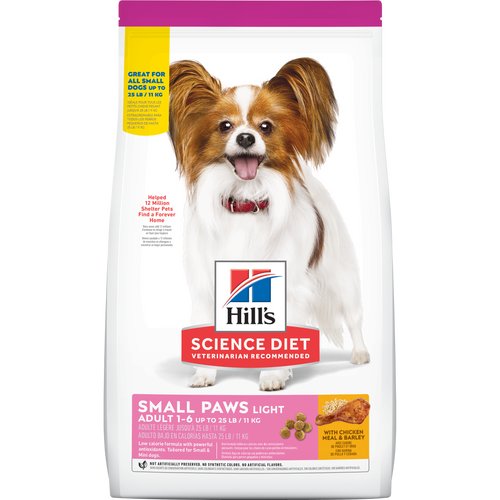 Adult Light Small Paws with Chicken Meal & Barley Dog Food
Adult Light Small Paws with Chicken Meal & Barley Dog FoodLow calories for less active small & mini dogs
Shop NowFeatured products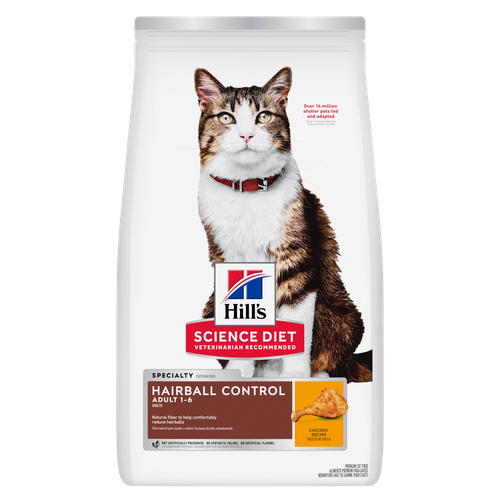 Adult Hairball Control Chicken Recipe Cat Food
Adult Hairball Control Chicken Recipe Cat FoodNatural fiber to help comfortably reduce hairballs
Shop Now Adult 7+ Chicken Recipe cat food
Adult 7+ Chicken Recipe cat foodSupports energy level and beautiful fur in mature cats
Shop Now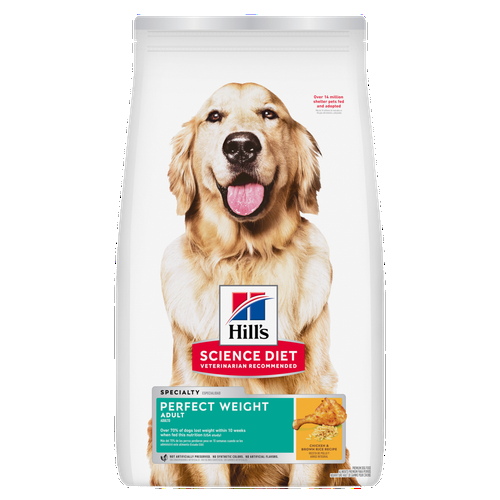 Adult Perfect Weight Chicken Recipe Dog Food
Adult Perfect Weight Chicken Recipe Dog FoodOver 70% of dogs lost weight within 10 weeks when fed this nutrition (USA Study)
Shop Now -
Dog
- Dog Tips & Articles
-
Health Category
- Weight
- Food & Environmental Sensitivities
- Urinary
- Digestive
- Joint
- Kidney
-
Life Stage
- Puppy Nutrition
- Adult Nutrition
- Senior Nutrition
Cat- Cat Tips & Articles
-
Health Category
- Weight
- Skin & Food Sensitivities
- Urinary
- Digestive
- Kidney
-
Life Stage
- Kitten Nutrition
- Adult Nutrition
Featured articles Keeping Pets Calm During Thunderstorms
Keeping Pets Calm During ThunderstormsIs your dog scared of thunder? Does your kitty dart under the bed at the first rumble? Learn a few tips for keeping your pets calm during the storm.
Read More How to Reduce Your Pet's Carbon Paw Print
How to Reduce Your Pet's Carbon Paw PrintHeaded outside? How you and your pets engage with nature can affect the environment, so here are some quick tips for reducing your pet's carbon paw print.
Read More Moving With a Pet: A How-To Guide
Moving With a Pet: A How-To GuideDiscover helpful tips for moving with your pet including safety recommendations to keep in mind on moving day & pet behavior to watch for at your new home.
Read More -


"You can't teach an old dog new tricks," might be a cliché saying, but is it true? Read on for the real scoop on teaching an old dog new tricks, and learn tips for training an older dog.
"You Can't Teach an Old Dog New Tricks"
The original saying went, "An old dog will learn no tricks." No one is certain of the exact origins of the phrase, but it appeared as early as 1721 in the book "Divers Proverbs" by Nathan Baily, says Know Your Phrase. While that proverb uses dogs as a metaphor for the stubbornness of human nature, an even older version can be found in a book on animal husbandry from the 1500s which states, "it is hard to make an old dog to stoop," referring to teaching a dog to put their nose to the ground to track scent. Cuteness points out that these sayings originated at a time when dogs were trained to perform specific jobs such as herding or hunting, abilities that would naturally decline as dogs aged and lost the use of their senses.
Puppies vs. Senior Dogs: How Do They Learn Differently?
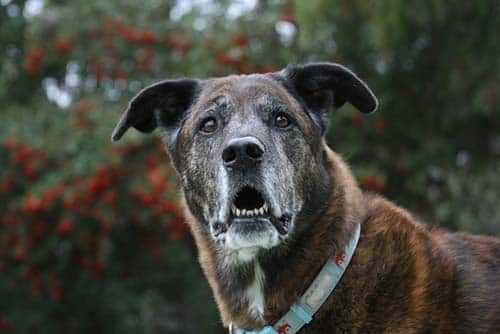
While declining health might prevent older dogs from being able to perform certain tasks, they still have the ability to learn new skills — though at a slower rate than puppies and younger dogs, according to an article in the journal, Age. In a study conducted at the University of Vienna's Clever Dog Lab, a test of dogs' ability to learn to distinguish between objects found that dogs around 10 years of age took more than twice as many repetitions and corrections than puppies 6 months to 1 year old. However, the older dogs outperformed the young pups in logic and reasoning tasks, suggesting that older dogs stubbornly refuse to unlearn what they already know. The study found no age difference in dogs' ability to retain their training.
Breeds More Likely to Learn in Older Age
While the study found no correlation between aging dogs' ability to learn and dog breed, it stands to reason that breeds that are easier to train while young will remain easier to train as they age. Breeds that do best at learning new skills, says iHeartDogs, include the poodle, golden and Labrador retrievers and herding breeds such as the German shepherd, collie and Shetland sheepdog. Both Cardigan and Pembroke Welsh corgis are also highly trainable.
Why Try to Train an Older Dog?
There are many possible reasons for training an older dog: Perhaps you've adopted a senior dog who needs to learn how to fit into your household, or maybe your older dog has had a rough past and needs to be resocialized or desensitized to fear triggers. Here are a few more reasons you may want to train an older dog:
- To house train a former outside dog
- To prepare for a new experience, such as travel
- To introduce new activities to promote exercise and healthy weight
- To provide a refresher course on obedience training
- To help prevent boredom and cognitive decline


Tasty Tips
Tips for Training a Senior Dog
As dogs age, many develop health conditions that limit their learning ability, including joint pain, vision or hearing loss, and decline in cognitive function, says Rover.This might mean you should avoid trying to teach your senior dog more vigorous games or activities, but the good news is that older dogs can still learn new things. It simply takes more time and patience to train an older dog.
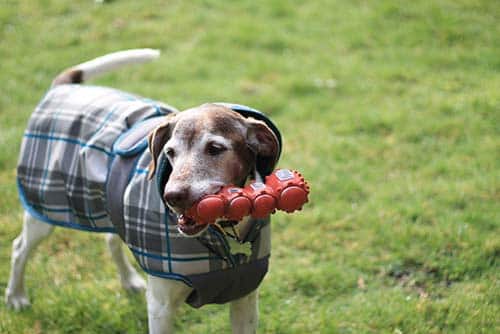
Here are some tips to help make teaching an old dog new tricks a little easier:
- Evaluate your pet: Does your dog have any health issues or cognitive dysfunction that will make it hard to perform the task you want to teach? If your reason for training is to address a behavioral problem, could an underlying health problem be to blame? For example, an older dog who's started soiling the carpet might have bladder problems that need to be treated rather than a refresher in house training. Talk to your veterinarian to make sure your dog is healthy enough for training.
- Exercise first: For dogs who are easily distracted and have a hard time paying attention, a walk or a game of fetch prior to the training session will help them release pent-up energy, so they can relax and be more focused.
- Reward them: Giving your pup their favorite dog treat each time they do what you want will create positive associations between the command and the desired outcome. If your pooch doesn't respond well to treats, or if you're watching their weight, reward them with lots of praise and petting, or give clicker training a try.
- Ignore undesirable behavior:It may sound counterintuitive, but calling attention to your dog if they get distracted, lie down, wander off or refuse to cooperate will only serve to reinforce that behavior. The best thing to do is ignore it, reposition your pooch, and try again.
- Take breaks:It's easy to get frustrated when your dog doesn't seem to be catching on, and it's very likely your old pup feels the same way. When this happens, stop the training and try again the next day.
- Be patient: Remember that older dogs need twice as much time and twice as much exposure than younger dogs to learn a new behavior.
- Practice, practice, practice: Your old dog needs consistent practice to learn a new skill. Skipping a day will only make it harder for your old friend. Keep going for as long as it takes, continuing to reward with treats and praise when your dog gets it right. Unless your dog suffers from dog dementia, which might make learning impossible, there's a good chance they'll pick up the trick eventually. Even after they do, daily practice will help ensure that they retain the new skill.
Despite the old adage, teaching an old dog new tricks is possible. Training an older dog simply takes time and repetition along with a whole lot of patience and love.


Jean Marie Bauhaus is a pet parent, pet blogger, and novelist from Tulsa, Oklahoma, where she usually writes under the supervision of a lapful of fur babies.
Related products

For the unique nutritional needs of mature Small & Mini Dogs

Clinically proven kibble technology to reduce plaque & tartar build-up

Science Diet's breakthrough nutrition supports ultimate digestive well-being & healthy microbiome

Low calories for less active small & mini dogs
Related articles

Learn about Hill's puppy food and the nutritional benefit & high quality ingredients that it contains for your pup.

Your dog's coat and skin are a big part of your dog's overall health. Ensure you keep your dog's coat healthy, by following these simple tips.

Understand the role that Omega-6 and Omega-3 fatty acids play in your dog's overall health, and how you can ensure they are getting enough.

Proper nutrition for your pregnant or nursing dog is vital to her and her puppy's health. Learn what you should do provide her with the proper nutrients.

Put your dog on a diet without them knowing
Our low calorie formula helps you control your dog's weight. It's packed with high-quality protein for building lean muscles, and made with purposeful ingredients for a flavorful, nutritious meal. Clinically proven antioxidants, Vitamin C+E, help promote a healthy immune system.
Put your dog on a diet without them knowing
Our low calorie formula helps you control your dog's weight. It's packed with high-quality protein for building lean muscles, and made with purposeful ingredients for a flavorful, nutritious meal. Clinically proven antioxidants, Vitamin C+E, help promote a healthy immune system.

